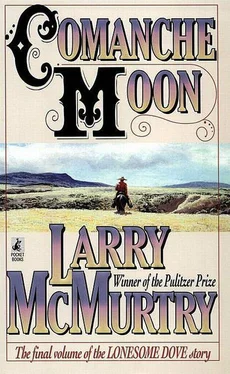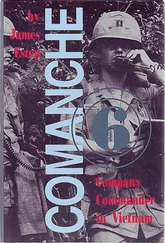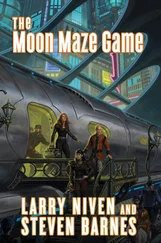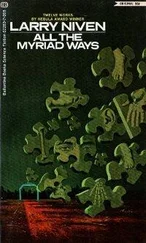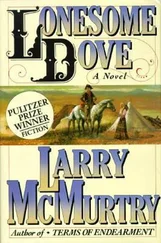Red Hand didn't know what High Rabbit's mother might have told her, because he had left the village immediately and had not been back. As soon as he came to a stream he washed himself many times, though he knew the washings would do little good. The impurity would strike him inside, where he couldn't wash it away. His assumption was that he would die soon; he wanted to pray as much as possible before his end came, and the rock pile seemed as good a place as any. In his mind contact with impure blood meant death and he wanted to hurry to a praying place and start praying. Some rattlesnakes had been around the rock pile when he arrived, but they soon went away.
Probably even the rattlesnakes knew of his impurity and hurried to their dens to dissociate themselves from it.
To Red Hand's surprise, he didn't die; now Buffalo Hump, leader of the great raid, had come upon him and seemed to find it amusing that he had chosen to pray on a rock pile. Of course Buffalo Hump didn't know about the dire thing that had occurred in Red Hand's lodge.
Red Hand would have liked a few ^ws with Worm about the matter of impure blood, but Worm had never liked him very much. Probably he would just tell him to go away and die if he knew about the blood.
Under the circumstances Red Hand thought it best to talk about something beside his choice of places to pray. Buffalo Hump was not a great chief for nothing. He might find out that Red Hand had come to the rock pile because he was stained.
"Kicking Wolf is back," Red Hand said.
"He was very weak when he found us and he sees two deer where there is one." Buffalo Hump was not concerned with Kicking Wolf's vision problems.
"Where is the Buffalo Horse?" he asked.
"I don't know about that, but the worst thing is that Three Birds did not return," Red Hand said. "The Black Vaquero got him." "If he got Three Birds, how did Kicking Wolf get away?" Buffalo Hump asked.
Then Red Hand realized that he did know what had happened to the Buffalo Horse--he returned in his mind to an earlier part of the story; he was so upset about his impurity that he could not remember events in a straightforward way. Now he suddenly remembered about the Buffalo Horse --an Apache had told Slipping Weasel about him. The Apache had heard the story from a man who was wandering.
"Wait, I was in my prayer, I forgot this," Red Hand said. "They cooked the Buffalo Horse in a great pit, but they took away his head and cooked it somewhere else. It took a whole village to eat him. I think Ahumado ate his head. They also caught Big Horse Scull and hung him in a cage." "I was wanting to know about Kicking Wolf," Buffalo Hump said, without impatience. He could tell that Red Hand's mind was in a disordered state. He was talking rapidly, although there was no need to hurry their talk.
"Ahumado did catch Kicking Wolf," Red Hand said. "He tied him to a horse and the horse almost dragged him to death. But Big Horse Scull cut him loose." "What did Ahumado do with Three Birds?" Worm asked.
"There are some stories about Three Birds but I don't know if they are true," Red Hand said. "An Apache said that Three Birds flew off the Yellow Cliff. He did not want to go in the cage where they put Scull." "I don't think Three Birds could fly," Buffalo Hump said. "I will ask Kicking Wolf about it myself. He may know more than that Apache." "He may, but since the horse pulled him he sees two deer where there is one," Red Hand told him.
On the ride home Buffalo Hump asked Worm about the things Red Hand had said, but Worm was not very informative. He was annoyed that Kicking Wolf had taken the Buffalo Horse to Mexico, to be eaten by a village.
"We could have cooked it in a pit ourselves," Worm said. "We could have eaten it as quickly as that village." Later, in camp, Buffalo Hump mentioned Worm's complaint to Kicking Wolf. The latter was having his hair greased by one of his wives, at the time.
"Worm thinks you should have let us eat the Buffalo Horse," Buffalo Hump said.
"If Worm had stolen it he could have eaten it, but I stole it and I wanted to take it to Mexico," Kicking Wolf said. "Anyway, Apaches are liars. The Buffalo Horse may still be alive." Buffalo Hump saw that Kicking Wolf was in a quarrelsome mood. He had been about to tease Kicking Wolf a little--af all, the man had missed the great raid--but he decided to let it be, mainly because he was anxious to see Lark and his other wives. Fat Knee had ridden ahead to let them know he was coming, so they would probably have cooked him something good. He wanted to eat.
Kicking Wolf he could tease anytime.
"How about Three Birds?" he asked, before going on to his tent. "Do you think he is still alive too?" At that Kicking Wolf merely shook his head.
He didn't think Three Birds was alive, and it was a sorrow to him.
"I didn't want him to go to Mexico," he told Buffalo Hump. "I was going to take the horse myself. I wanted Three Birds to go home, but he came to Mexico anyway. He wanted to be brave." Though Buffalo Hump had always considered Three Birds a fool, there was no doubt that what he had done had been very brave.
"He got his wish," Buffalo Hump said. "He was brave. When your eyes are better we will sing for him, some time."
When the wild black cow came popping out of a thicket of mesquite and chaparral, she was on them and had gored Deets's horse badly in the flank before the rangers even knew what kind of beast they were dealing with. The horse squealed and fell over, throwing Deets almost under the cow, whose horn tips were red with the horse's blood. The cow lowered her head when Call and Gus shot her, firing almost at the same time. The bullets knocked the cow to her knees but didn't kill her. Even on her knees she tried to go for Deets--it took a bullet to the head to kill her.
Deets was shaking, as much from surprise as from fright. His horse gushed blood from its torn flank.
"My horse dying," Deets said, stunned.
"Well, where'd she come from?" Pea Eye asked. All he could remember was that a black streak with short shiny horns came popping out of the brush--he had had no time to make precise observations.
"She came out of that!" Augustus said, pointing to what seemed to be an impenetrable thorny brush. The mesquite and chaparral grew out above a solid floor of green prickly pear.
"Maybe she had hydrophobie," Stove Jones volunteered. "I've lived with cows and such all my life, but I've never seen a cow charge a bunch of men like that." "Just be glad it wasn't one of them tough little black bulls," Lee Hitch said. "One of them little black bulls would have done for about half of us." "You can't kill a bull with no pistol bullet," he added. "Not even with ten pistol bullets." A mile or two farther--Deets was now riding double with Jake Spoon, who had the stoutest horse--they came upon three of the small black bulls Lee Hitch had described. Everyone in the troop drew their rifles, expecting to have to defend themselves, but the bulls were content to paw the earth and snort.
Then, just as they were about to stop for coffee and a bit of bacon, a second cow came shooting out of the brush behind them. This time the rangers were primed, but even so it took three rifle shots to bring the cow down.
In midafn it happened a third time. A red cow came charging directly at them, breathing froth and bellowing. All the rangers shot this time and the cow went down.
Call, though profoundly startled by the violent behaviour of the wild south Texas cows, held his counsel, meaning to talk the development over with Augustus privately, when they camped.
Gus McCrae couldn't wait for a private parley. They were scarcely south of San Antonio and had just been attacked three times, with the loss of one horse. They had seen no ranches or ranchmen who might advise them on the bovine behaviour they were encountering. The rangers were jumpier now than they would have been if they had been crossing the comancher@ia--in the space of an afternoon they had come to fear cattle more than they feared Indians. And it was the cattle of the country, hundreds of them, that they were supposed to round up and deliver to Mexico.
Читать дальше
